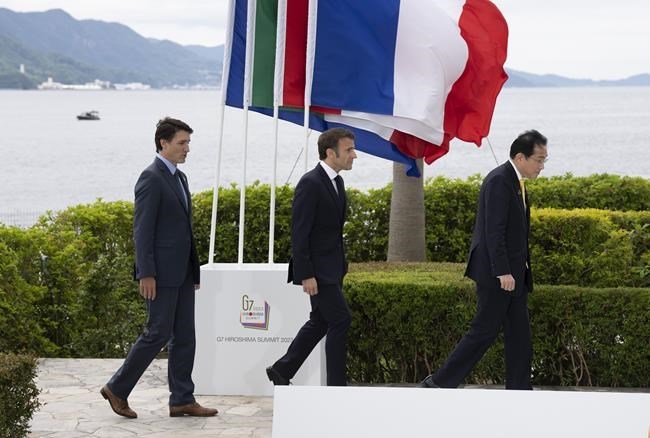HIROSHIMA, Japan — Prime Minister Justin Trudeau met with Ukrainian President Volodymyr Zelenskyy Sunday morning in Hiroshima, as G7 leaders committed to supporting Ukraine for as long as it takes.
Canada and the G7 have also reasserted their intention to decrease their economic dependency on China while specifically calling on the country not to conduct "interference activities."
Trudeau and Zelenskyy hugged upon meeting and delivered short remarks before media.
"I just have to say it is so good to see you," Trudeau said, adding that the G7 stands as strongly with Ukraine as Canada does.
The prime minister said good conversations are happening with emerging economies on Ukraine as well.
"It's good to see you. I want to thank you, your government, also Canadian people for supporting us," Zelenskyy responded.
The leaders gathered for their annual summit in Hiroshima, Japan put out a joint communiqué on Saturday that included the new language on foreign interference at Trudeau's request.
It warned China it must "act in accordance with its obligations" under the treaties that govern diplomatic and consular relations, "and not to conduct interference activities aimed at undermining the security and safety of our communities, the integrity of our democratic institutions and our economic prosperity."
A Canadian official said during a media briefing ahead of the document's release that Trudeau had specifically raised the issue with his counterparts from the United States, United Kingdom, France, Germany, Italy and Japan.
World leaders have faced a high-stakes balancing act in Hiroshima as they look to address a raft of global worries demanding urgent attention, including climate change, artificial intelligence, poverty and economic instability, nuclear proliferation and, above all, the war in Ukraine.
Their communiqué was released ahead of schedule to accommodate an appearance by Zelenskyy, who arrived in Hiroshima Saturday afternoon after attending the Arab League summit in Saudi Arabia.
His appearance came after G7 countries announced new sanctions on Russia on Friday.
The communiqué reaffirmed the nations' support for Ukraine in the face of Russia's invasion, saying they would continue to bolster the country's efforts "for as long as it takes."
The leaders, who met in a city once decimated by an atomic bomb, also committed to working toward a world without nuclear weapons, "with undiminished security for all."
Amid China's growing influence, the leaders said they plan to protect themselves by working together to counter economic coercion and stand against unfair practices.
But Trudeau and his counterparts also said in the document they seek "constructive" relations with the world's second-largest economy.
"Our policy approaches are not designed to harm China nor do we seek to thwart China's economic progress and development. A growing China that plays by international rules would be of global interest," the document said.
"At the same time, we recognize that economic resilience requires de-risking and diversifying. We will take steps, individually and collectively, to invest in our own economic vibrancy. We will reduce excessive dependencies in our critical supply chains."
Last week, Chinese Foreign Ministry spokesperson Wang Wenbin said China itself is a victim of economic coercion.
"If any country should be criticized for economic coercion, it should be the United States. The U.S. has been overstretching the concept of national security, abusing export controls and taking discriminatory and unfair measures against foreign companies," Wang said in a routine news briefing.
As G7 nations aim to woo countries away from China and Russia and to their side, Japan invited countries from the Global South to participate in this year's summit.
And as part of its efforts to broaden its alliances, Canada announced new investments to support people in emerging economies and developing nations.
The hundreds of millions of dollars announced will go toward addressing climate change, energy, food security and women's issues.
Trudeau is expected to hold a news conference on Sunday as the summit concludes.
This report by The Canadian Press was first published May 20, 2023.
— With files from The Associated Press.
Nojoud Al Mallees, The Canadian Press




